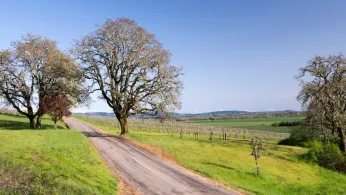
3 hours ago
McMinnville’s Queer Renaissance: How Oregon’s Wine Country Is Redefining Small-Town LGBTQ+ Inclusion
READ TIME: 3 MIN.
In the heart of Oregon’s Willamette Valley, McMinnville is rewriting what it means to be a small town in America. Once known primarily for pinot noir and picturesque vineyards, this community is now gaining national attention for its robust embrace of LGBTQ+ inclusion. The shift isn’t accidental—it’s the result of coordinated efforts by residents, business owners, and local government to transform McMinnville into a place where all identities are celebrated .
A watershed moment for McMinnville came in 2022, when Remy Drabkin—an openly queer entrepreneur and longstanding advocate for LGBTQ+ equality—was elected mayor . Drabkin’s election sent a strong signal throughout Oregon that rural towns can—and do—lead on queer inclusion. Under her leadership, McMinnville has prioritized the visibility and well-being of LGBTQ+ residents and visitors, supporting public celebrations and ensuring that queer voices are heard at every level of civic life .
Drabkin’s advocacy is personal and practical: she founded Remy Wines, one of the region’s first openly queer-owned wineries, which quickly became a haven for LGBTQ+ gatherings and local activism . In interviews and public statements, Drabkin has described McMinnville as “a place where people are free to be their authentic selves,” and her administration has worked with local businesses to create pathways for queer entrepreneurs to thrive .
McMinnville’s most headline-grabbing new event is the Queer Wine Fest, first held in June 2022 and now an annual celebration of LGBTQ+ winemakers, viticulturists, and allies . Launched by Remy Drabkin and a coalition of queer wine professionals, the festival brings together participants from across North America to taste local vintages, attend panels on inclusion in agriculture, and celebrate the power of representation in the wine industry.
The event is notable not only for its joyous atmosphere—complete with drag performances, live music, and rainbow-themed tastings—but also for its impact on the broader community. Businesses display Pride flags throughout the historic downtown, and festival proceeds support local LGBTQ+ organizations, including youth programming and health initiatives .
McMinnville’s queer renaissance isn’t limited to special events. Throughout the year, local businesses—including cafes, bookstores, and art galleries—actively support LGBTQ+ inclusion. The downtown district features several queer-owned establishments, and many display signage or window stickers affirming their commitment to safe, welcoming spaces for all customers .
Community organizations such as PFLAG McMinnville and the Willamette LGBTQ+ Network host regular meetups, workshops, and outreach programs for queer youth, transgender people, and allies . These efforts have helped foster a culture of mutual support that extends well beyond the city limits, with neighboring towns increasingly modeling similar inclusive practices.
Local schools and healthcare providers have also made strides in affirming LGBTQ+ identities. Several schools have adopted anti-bullying programs and inclusive curricula, while medical clinics offer gender-affirming care and mental health resources tailored to the needs of the LGBTQ+ community .
For LGBTQ+ travelers seeking a destination that balances small-town charm with progressive values, McMinnville offers a rare sense of belonging. Its commitment to inclusion is visible in everyday interactions—whether you’re sipping wine at a queer-owned vineyard, browsing locally made crafts, or attending a Pride parade that feels genuinely community-driven .
The town’s hospitality industry, from B&Bs to boutique hotels, has embraced best practices for welcoming LGBTQ+ guests, and local tourism offices provide resources for queer travelers, including safety information and event calendars .
McMinnville’s story is a testament to what’s possible when a community prioritizes radical inclusion, leadership, and cultural celebration. As rural America faces ongoing challenges around equity and representation, this Oregon wine town stands out as a model for change—and a destination worth discovering.






